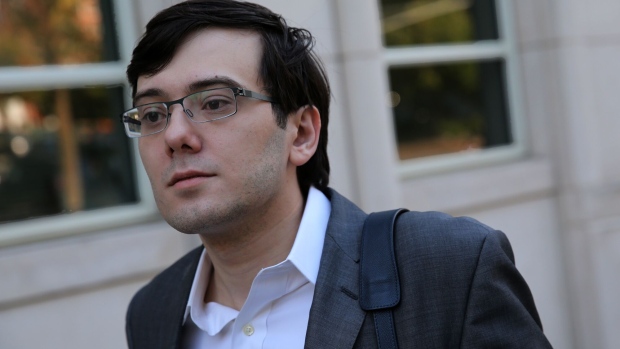Dec 14, 2023
Martin Shkreli Says Pharma Ban Keeps Him From Even a Drugstore Job
, Bloomberg News

(Bloomberg) -- Martin Shkreli, the “Pharma Bro” who served nearly seven years in prison for defrauding investors, asked an appeals court to set aside an order that his lawyers said prevents him from working in the industry, or even as a Walgreens cashier.
Lawyers for Shkreli, the former chief executive officer of Vyera Pharmaceuticals, told the US Court of Appeals that the 2022 ban violated his constitutional rights. In addition to the ban, the 40-year-old was also ordered to pay $64 million over a scheme to control the market for the drug Daraprim, an anti-infection medication used to treat a sometimes-deadly parasitic infection called toxoplasmosis.
The injunction “excludes him from entire sectors of the economy that have nothing to do with” his conduct in the case, Kimo S. Peluso, an attorney for Shkreli, told federal appeals court judges in New York Thursday.
Shkreli in 2015 acquired Daraprim from the only supplier of the drug and immediately raised the price from $17.50 to $750 per tablet, earning him the unofficial title of the “most hated man in America.”
He was convicted in 2018 of defrauding investors in hedge funds he ran by lying to them about his performance, as well as a separate scheme involving Retrophin Inc. He was released in May 2022, four months early, from a low-security federal prison in Allenwood, Pennsylvania, and sent to a halfway house.
Shkreli’s attorneys have argued that the industry ban and fine “far exceed” the limits of the US Constitution and the powers of federal courts. They contend that the order barred him “from participating in an entire industry for the rest of his life, without any measures to tailor the injunction to Shkreli’s specific conduct.”
Walgreens Cashier
Judge Denise Cote’s order “excludes Shkreli from virtually any role in virtually any part of the entire pharmaceutical industry, which itself is a sprawling collection of varied businesses,” his lawyers said in court filings, noting that the ban could bar him from working as a cashier at Walgreens.
The Federal Trade Commission and seven states sued Shkreli and Vyera in 2020. Vyera in December 2021 agreed to pay as much as $40 million to resolve a Federal Trade Commission suit over the Daraprim scandal. It was among a group of companies affiliated with Shkreli that filed for bankruptcy protection in May after a series of lawsuits and competition from generic drugs. The action was taken by independent directors who were brought in by a court-appointed receiver who took control of Shkreli’s shares.
The FTC has argued that Shkreli is a “serial recidivist without remorse” who continued his “dangerous, incorrigible misconduct” even while behind bars. Bradley Grossman, an attorney for the agency, told the appeals court that the injunction is needed because it is undisputed that Shkreli “controlled an unlawful scheme” to block generic drugs and only tightened his control after going to prison.
“He showed reckless indifference to the health and safety of the most vulnerable members of society,” Grossman said.
Cote “went out of her way to look at Mr. Shkreli’s background and she saw this is an individual who has no training or experience in this industry outside of this scheme” and “decided the risk is simply too grave” for someone who “spent his entire career evading restrictions and targeting the most vulnerable individuals.”
The US Probation Office in May said Shkreli was living with his sister in Queens and making $2,500 a month consulting for a law firm.
©2023 Bloomberg L.P.


